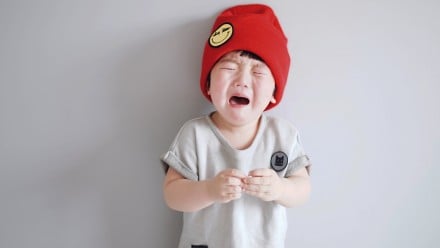It came out of the blue, but it hung there like heavy, humid air: “I hate you.” I’d been shivering in the cold among fellow parents, waiting for my kids to emerge from a weekend class they’d recently joined. Out they spilled, buzzing with new friends, heading for the jungle gym, and I signalled benignly to my nine-year-old daughter that we were leaving. She announced it calmly and quietly, but within earshot of the lot, before taking off for the monkey bars. She seemed jubilant. I was destroyed.
How many of us have heard those three little words and wanted to cry? The H-word is so loaded and so mortifying for its recipient that we’re loath to admit the expression ever gets said. It’s far more common, though, than we’ll ever cop to. And I’d wager that if a kid hasn’t said it aloud, he’s at least thought it. I mean, I sure did. Between the ages of 10 and 16, it was practically my mantra. But “hate” was not hate. It was love on a bad day.
It’s important to remember that when coming from a child, “hate” doesn’t translate to the passionate dislike we understand as adults. It’s an impulse word signifying frustration or loss of control. “What they mean,” says Jeanne L. Williams, an Edmonton-based psychologist, “is, ‘I can’t handle this situation, and I don’t have the skills to respond in a more mature way.’” Plus, it doesn’t take much for kids to feel the effect words can have—and they can get heady with the power they can wield.
The dreaded phrase does have slightly different implications depending on whether it comes from a toddler or a tween—and the art of the response should vary accordingly.
The toddler
You’ve spent the afternoon at a playdate. The kids are sharing nicely, but yours has become attached to her pal’s favourite doll. When it’s time to leave, your gentle coaxing fails, and you resort to prying the doll away and strapping your daughter into her stroller. Soon the scene is like WrestleMania, with your daughter using fightin’ words.
Saying “no” in any form can set off a toddler. And if your kid has heard “I hate you” tossed around, this is the time she’d deploy it. “Toddlers are picking up the language they hear around them—they’re parroting back what they’ve heard, like when they use swear words,” says Judy Arnall, a family life educator in Calgary and author of Parenting with Patience. In the same way you should ignore the F-word from an experimental toddler in an effort to diffuse it with silence, you should disregard the H-word. Case closed. “Don’t engage. You don’t want to draw attention to it,” she says. When kids see it’s a surefire way to grab your attention, they’ll try it again and again.
The little kid
It’s bedtime and you’ve asked your son, who’s watching TV, to go change into his pyjamas. After the third request, he has still not “heard” you, so you flick off the screen—possibly at a climactic moment. Does the pivotal plot point matter to you more than getting him into bed? Nope. An argument breaks out, and he lays it on you.

10 ways to defuse a power struggle
“When little kids say ‘I hate you,’ the goal is to hurt you,” says Natasha Daniels, a clinical social worker at Hill Child Counseling in Arizona. After all, you’ve just ruined all their fun. Daniels’ response? Kill it with kindness. “It sounds counterintuitive, but the best way to counteract ‘I hate you’ is to say, ‘Well, I love you,’” she says. A negative reaction will only reinforce the outburst. “If they don’t get a reaction at age six, they may say it again, but they won’t still be saying it at 10. It’s a work in progress.”
As children’s language skills improve as they get older, you can start to talk about and validate those intense feelings. But you shouldn’t dwell on it too much—otherwise they’ll realize they have a winning strategy of getting your attention. Williams remembers one particular argument about video games when her son was in grade one. “I wanted him to brush his teeth. In anger, he said he hated me.” They both went to bed angry, but the next day, Williams debriefed with him. “He stood by those words because he was really mad at me, and they were the only words he had. But it came out that he hadn’t wanted to stop playing because he’d lose all his points. I listened and took him seriously. And we worked out a system of warnings to make sure he could stop between levels without losing his points and still get to bed on time.”
The tween
Your 11-year-old daughter is invited to a sleepover and “absolutely everyone” is attending. But she’s been falling behind on her homework, and a recent spate of late nights has left her in a perpetual foul mood. You say no to the sleepover, hoping she’ll rest up and have a clear head for homework in the morning. After running through the five stages of grief, she flees to her room, slamming the door—but not before sticking it to you with three choice words.
Tweens do grasp the meaning of “I hate you” and they’ll deploy it for maximum impact. But the advantage of having an increasingly articulate child is that sometimes she can’t help blurting out what’s really bothering her. “Sometimes what she says right after ‘I hate you’ is important,” says Daniels. Whether it’s “You never let me do anything fun” or “Why do you hate my friends so much?” at least you have a clue to go on. “It gives you some sort of context, so you know it’s not random hate.”
“I look at this as a ‘downstream problem,’” says Williams. “Think of a flowing river. The event that precipitated it is upstream. If you dwell on what happens downstream, like taking away privileges, the issue upstream will just keep flowing.”
You need to focus on what really is making your child upset. But first, give her some time to calm down. And once you’ve figured out what’s bothering her, says Williams, “you can really listen to her concerns and share your own. Then figure out some way to meet in the middle.”
About to lose it?
“Less is more,” says Terry Carson, a Toronto-based parenting coach. “If you can respond to a child calmly in five words or less, you’ll be far more effective than if you get into a long response.” Prime no-nos? Avoid “Don’t you speak to me like that” or “You’re grounded.” Punishments don’t suit this particular crime. “Sending back hurtful messages only exacerbates the situation. You can say something like, ‘That hurt my feelings,’ and give yourself time to de-escalate the situation. Don’t try to resolve it in the moment.” If you do lose your temper, don’t despair. “There’s nothing wrong with damage control,” she says. “For a parent to apologize is a big deal for kids.” If you respect them, after all, they may respect you back. “Ask if they’re ready to talk. They may not be ready, but that’s a respectful approach, even to a nine-year-old.”
Read more:
7 ways to deal with a defiant kid
29 toddler discipline tactics that work


